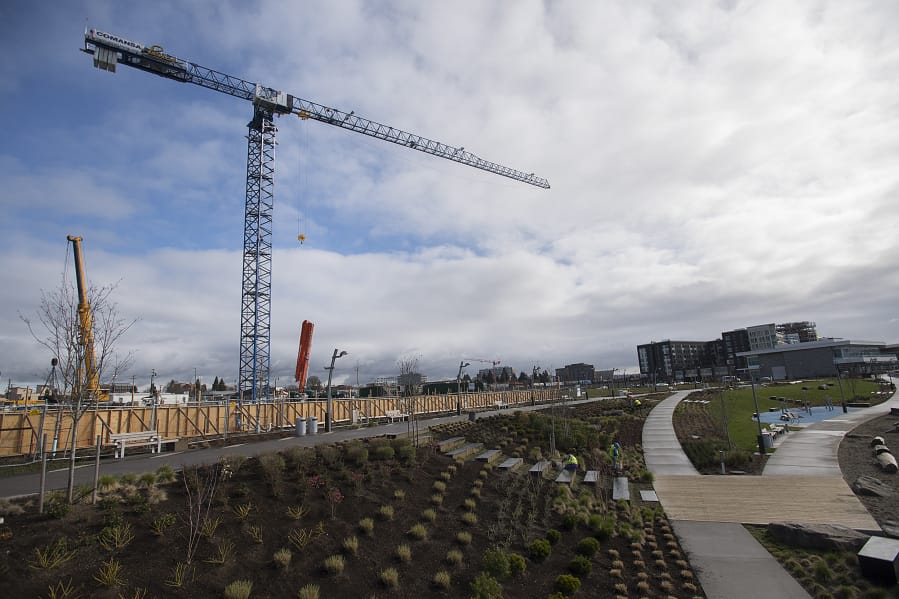In the 28 years that Chad Eiken has worked for the city of Vancouver, there have never been so many apartments or condos planned for downtown than there are now.
“We’ve never seen this level of multifamily construction,” he said.
A tower crane rose Monday over The Waterfront Vancouver’s largest apartment complex, called The Columbia, and the Holland Partners is nearing completion of the Vancouvercenter’s fourth tower. They’re just a few examples of the new structures for future downtown dwellers.
Eiken, the Community and Economic Development Department director, said downtown has about three times as many apartment or condo buildings planned or under construction than during the last few decades.
With a boom in downtown construction, higher density is sure to follow. With more available apartments, rents could fall over time, and it will likely bring more amenities — including grocery stores, restaurants, retail stores and nightlife. It also will likely make downtown safer, industry experts say, and transportation will shift to walking, public transportation or other alternatives.
Apartment rentals
Downtown has about 19 apartment buildings in the planning or construction phase. Those comprise about 2,029 apartments or condo units, and more buildings have been announced but not submitted for permitting.
“Even as projects are being completed and coming online, more projects are being added,” Eiken said.
That’s about 10 times the number of available apartments in downtown Vancouver, according to Apartments.com, which lists 216 apartments for rent as of Wednesday.
Apartment rental rates are also at an all-time high. ApartmentList.com lists Vancouver’s average rental for a one-bedroom at $1,420 and a two-bedroom at $1,675, slightly up from last year.
“We’re in an unusual housing equilibrium with a higher rent,” said Scott Bailey, regional economist for Southwest Washington. “And I wonder if somewhere down the line we come back to a more historical baseline.”
Bailey said that there’s a typical economic cycle for multifamily developments that could predict lower apartment prices in the future and more incentives to sign a lease.
“Historically, when the financial signal is ‘go’ and there’s money available, then there’s a rush,” he said. “They tend to overshoot (development) and then the financial equation switches, and very little capital is available for development.”
Typically when too many apartments become available, leasing agencies start offering free rent for the first month and other incentives, which could happen once more apartment buildings open in Vancouver.
The city as a whole has 6,648 multifamily residential units in the process of planning or being built, Eiken said. Like downtown, that’s about three times the number that Eiken has seen in the past, he said.
Amenities
Eiken said that a more robust downtown is good for the city.
“It adds life,” he said. “It makes it more inviting to those who don’t live downtown to come. There’s a certain amount of excitement. It’s turning from a 10-hour downtown to an 18-hour downtown.”
Eiken said the city has been trying to get a grocer downtown. It may happen with more downtown density, he said, but it hasn’t happened yet. Last year, the city gave up trying to convince a grocer to build on Block 10, an undeveloped lot northwest of Esther Short Park. Block 10 is now being developed into a six-story mixed-use building by Holland Partners.
“We’ve talked to grocers directly and talked to developers who have tried to convince them to come. We hear the same thing from all of them: There has to be enough rooftops and enough disposable income.”
Eiken said that the Columbia River severs a one-mile radius that grocers use to consider the number of customers, and that excludes residents of Jantzen Beach.
“It knee caps the number,” he said. “We need more density and more rooftops in the north half of that circle around downtown to make grocers more comfortable.”
Alex Brennan, executive director of Futurewise, a Seattle-based group that advocates for carefully planned urban growth in Washington, said more density in downtown means more people going to coffee shops, restaurants, running errands and shopping locally.
“Having that mix of residents in the evening and workers there during the day is essential to healthy retail and restaurant businesses ,” he said. “That means they’ll have customers throughout day.”
Brennan also said it will make the downtown safer, which Eiken agreed with.
“It means you’ll have more eyes in the street,” Brennan said. “More people will be paying attention to something bad in the street or park; someone’s going to call 911. There’s a safety improvement.”
Transportation
Transportation is also likely to change with a higher density. More public transit, rideshare and bikeshare companies, and scooter rentals such as Lime Scooters, will become more of a possibility, Eiken said.
Traffic could get worse and parking could be slightly harder to find and more expensive, but there are multiple parking garages being considered for downtown: one at The Waterfront Vancouver’s Block 7, and another close by, at the city of Vancouver’s Waterfront Gateway, south of City Hall.
Another company called RYD is also trying more innovative ways to help with parking. The company is leasing parking lots bordering downtown and shuttling people to and from their downtown workplaces in electric cars. It also plans to act as more of a taxi for downtown residents as it expands.
“There’s a side that says density is good for mass transit,” said Bailey. “You’ll likely attract more services in the area. It’s good for transit and good for the people living there.”
Brennan agreed.
“The more people downtown, the more effective transit service to downtown will be,” he said. “You really need that density to support transit that makes it work.”
Brennan said Vancouver will have a bigger demand for parking, but increasing parking meter rates generate revenue for better city-funded alternatives for transportation to downtown.
“You can take that revenue and invest it downtown and improve it,” he said. “But you only charge more for parking if there isn’t enough to go around.”
More amenities in downtown, like grocery stores, and more office buildings in downtown mean families might not need as many cars, which will also reduce the growing need for parking spots, he said.




